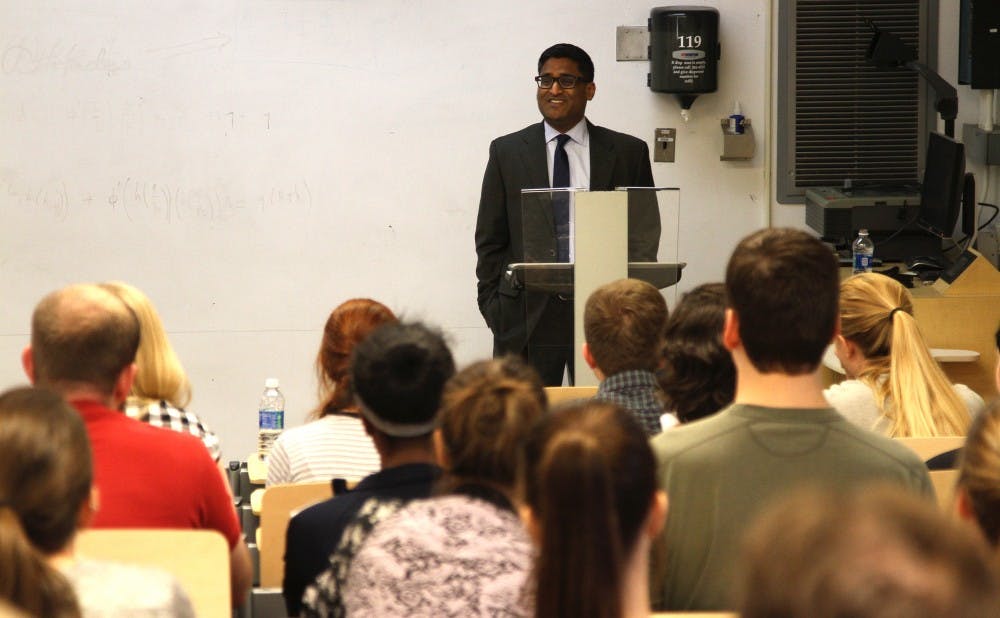Ramesh Ponnuru, a Bloomberg View columnist and a senior editor of the National Review, spoke about the importance of maintaining open dialogue on college campuses during an event Wednesday.
The discussion—hosted by the American Enterprise Institute at Duke and co-sponsored by other student groups—centered on the importance of free speech for a robust exchange of ideas. Ponnuru argued that political correctness hinders such free speech, and he defended open debate—particularly at universities.
“An important reason that we celebrate free speech is, to put it negatively, that we don’t want to be a people who are fearful and brittle,” Ponnuru said. “These days we seem to be in danger of becoming exactly that.”
Ponnuru analyzed recent events at universities that have incited debate about free speech, including the 2015 protests at Princeton University, when students called for the removal of 28th President Woodrow Wilson’s name from all university buildings because of his racist views. He also referenced incidents at Northwestern University and Harvard Law School, where he said faculty disputed specific interpretations of a federal statute that forbade sex discrimination at institutions of higher learning, and subsequently found themselves at risk of facing disciplinary action.
He stated that the most troubling aspect of political correctness in these instances is the threat to the free exchange of ideas.
“People who want to make campuses less tolerant of opinions with which they disagree see federal rules as weapons which they can wield,” Ponnuru said. “It seems to me that if we want to have a climate of robust free speech on college campuses, those people need to be disarmed.”
He also stated that offending certain people is a natural byproduct of debate that cannot be prevented, but must be accepted as part of human discourse—especially at universities, which are responsible for fostering such debate.
“Any offense taken, even offense legitimately taken, is simply irrelevant to the incursion of debate—the truth can hurt after all,” he said. “We should of course also follow norms of civility and discourage the gratuitous giving of offense. But even if we believe that someone is doing precisely that, it is better to tolerate that abuse than to risk harming the inquiry that is the university’s raison d’etre.”
In the question-and-answer portion that followed, senior Ted Yavuzkurt, a columnist for The Chronicle, asked Ponnuru if he had noted any positive trends concerning free speech at universities.
Ponnuru said he is heartened by the fact that a number of progressives have also spoken up in favor of free speech, citing President Barack Obama as an example.
“When conservatives like me defend free speech that’s one thing,” he said. “But the tendency to charge against it has happened among progressives, who will be more influenced by their fellow progressives.”
Senior Mac Findlay asked about college administrators who wish to defend free speech but are concerned for their jobs in the face of student protest movements.
“I would say keeping your job is not worth proving you don’t deserve it,” Ponnuru said.
He argued that such trade-offs may not be necessary in the first place, and that opposing protests would not inevitably lead to job loss. When he was an undergraduate at Princeton, students staged a sit-in to fight for the implementation of an Asian-American studies program, but the president did not accede to the demands of the protestors, Ponnuru said. He noted that the president was able to cope well with the consequences of his decision.
Ponnuru concluded his talk by emphasizing the necessity of debate and disagreement.
“We all have to be willing to engage in debate and allow other people to disagree with us and survive it and sort of grow up,” he said. “The world’s not a safe space and you need to prepare yourself for it.”
Senior Pi Praveen, president of Duke Political Union and chair of the executive council American Enterprise Institute, helped organize the event and acknowledged that it’s hard to get students to come to some events at Duke.
“I am very pleased with the turnout,” Praveen said. “It’s very difficult to get a lot of students to attend events at Duke University, and I’m really glad that enough people were interested to come and hear what our speaker had to say.”
Wednesday’s event was hosted by the American Enterprise Institute, the Executive Council, Duke Open Campus Coalition, Secular Students Alliance, Duke Political Union, Duke College Republicans, Public Policy Majors Union and Generation Opportunity.
Get The Chronicle straight to your inbox
Signup for our weekly newsletter. Cancel at any time.

